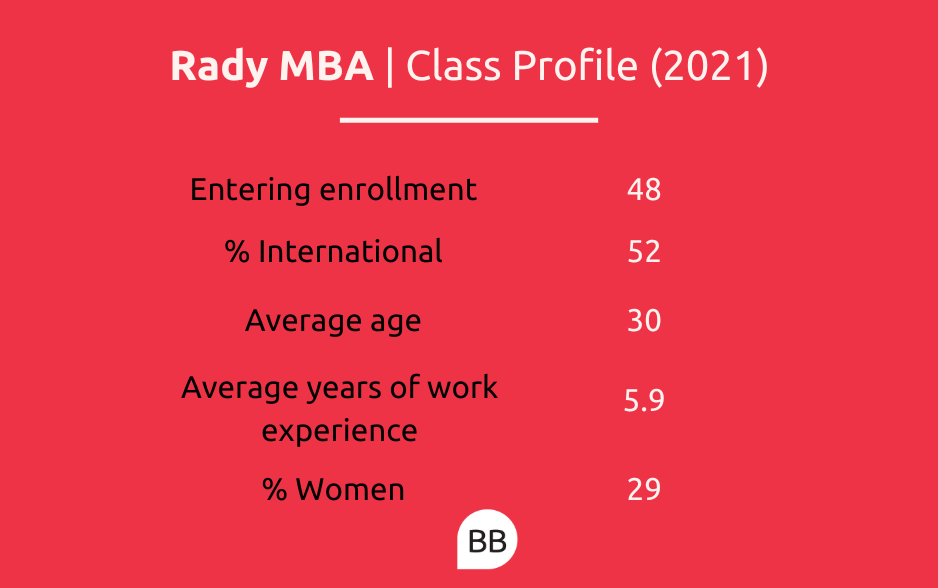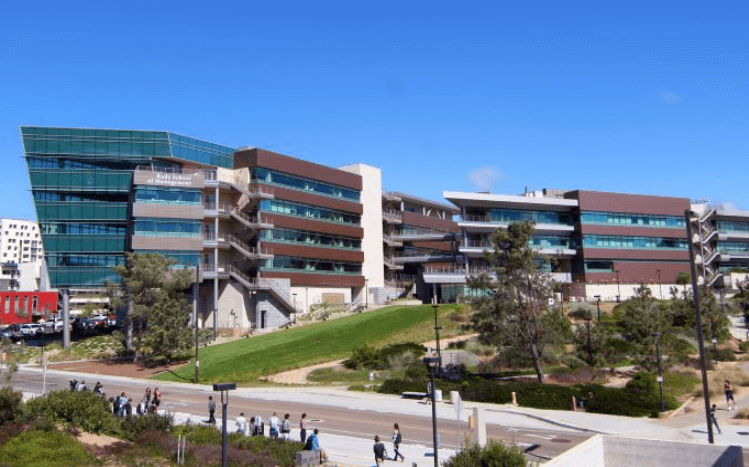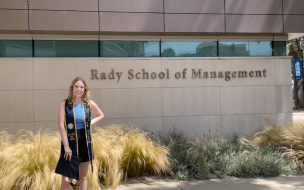Aside from the obvious advantages of being immersed in a warm climate and surrounded by sandy beaches, business school grads can use their time in San Diego to drive their business goals further.
The business school is home to the STEM-designated Rady MBA—a full-time degree that integrates business and science, helping new business leaders bridge the gap between the necessary management and technical skills required by employers.
San Diego is home to many biotech companies, offering a great launchpad for MBAs with an interest in life sciences and healthcare. Meanwhile, venturing north to San Francisco, business school grads can benefit from being in proximity to the technological powerhouse of Silicon Valley.
The Rady MBA offers various electives to suit students’ career aspirations, including Technology Innovation and Strategy and Consumer Behavior.
We caught up with Silvia McCallister-Castillo, executive director, MBA programs, and Matthew Alex, director of graduate admissions, to hear about what it takes to land a place in the San Diego MBA at Rady.
What makes the San Diego MBA at Rady unique?
Silvia:
UCSD is a STEM powerhouse—our STEM-designated MBA program helps students sharpen their analytical skills and helps them confidently learn to make data-driven decisions.
Hiring managers know that students in our programs excel at working with data and can learn new techniques and skills quickly. Rady has a unique faculty that brings hardcore science to the classroom in nearly all the required core classes. Many courses will start grounded in theory but focus on experimentation and testing to help students get comfortable with differentiating between good ideas and good business practices.
This carries through to electives such as Experiments in Firms and Research for Marketing Decisions.
Finally, our small size allows for students to build strong relationships with key stakeholders, like their peers, professors, and career coaches.
What do you look for in San Diego MBA applicants?
Silvia:
We look for candidates who are excited to flex their quant skills to make an impact in their organizations and their industries. Not all candidates have a strong quant background, but they can demonstrate their ability and enthusiasm by taking an online class or taking stretch assignments at work.
We’re also looking for people who can plan and execute. While it’s okay for an applicant to change their mind about their future career, it’s important to have a plan! The two years go by fast, and the strongest candidates have a rough outline about how they are going to prioritize their time over the course of the program.
Finally, we’re looking for community-minded individuals who are looking to build a life-long relationship with Rady.

What questions should candidates expect in their San Diego MBA admission interview?
Silvia:
We want to understand a candidates’ motivations for applying to business school in general and to Rady in particular, so candidates can expect us to ask questions about that.
We also want to get a sense of the candidate’s abilities to tell us a story about their experience and tie their past achievements to their future career goals, so we ask for examples about different professional experiences they may have encountered.
Finally, we want to see how a candidate will present in a professional interview setting. We do our best to put candidates at ease, but we want to see a certain level of poise and professionalism that shows that this is a candidate that we’re excited to put in front of employers.
Our coaches can help people get to the next level with their interview skills, but we want to see that you’ve rehearsed and prepped!
What’s the biggest mistake you can make in the San Diego MBA application?
Silvia:
Not fully conveying what your career goals are and how the MBA fits within your larger plans. The STEM MBA is a serious commitment—both of time and money. It’s important that candidates demonstrate that they’ve thought about how they will best take advantage of the time in the program to maximize their career opportunities. This is best done through the essays, but candidates should take a second look at their resumes and short answer questions as well.
Another simple mistake is not proofreading your essays and resume. Sometimes we will get an application in which a candidate forgets to change the name of the school they are applying to—and while we know that candidates often apply to several schools, that’s a silly mistake that may make us doubt your commitment. Getting a friend or colleague to proof with a fresh set of eyes can be very helpful.
Finally, candidates should make sure to take the time to meet and discuss their application with their referees. Strong references can help make or break an application and candidates should ensure that the referees know them well, are familiar with their work and that they know a little bit about why they want to come to Rady so that the reference can help highlight their best qualities.
What essay questions do you ask in the MBA application?
Matthew:
The essays are a critical part of the application because they provide the applicant with an opportunity to share their story and what lead them to pursuing an MBA at the Rady School of Management. Every applicant’s story and career aspirations are unique. The essays aid the MBA Admission Committee in crafting a class of diverse backgrounds, experiences, and goals and to evaluate each candidate’s writing ability. Being able to effectively communicate complex ideas through writing is an essential skill for graduate business students and for prospective employers after graduation.
When writing your essays, we recommend being thoughtful, sharing your personal story, and connecting your experiences to your career goals. Also, don’t forget to have someone proofread your essays!
How important is a good GMAT score in the application process?
Matthew:
The GMAT and GRE are not required for admission to the Rady School of Management MBA programs. However, all Full-Time MBA applicants are encouraged to take the GMAT or GRE and to submit official test scores with the application for admission to provide additional evidence showing preparedness for the quantitative rigor of the program.
The Rady MBA is a highly quantitative MBA program, so the MBA Admissions Committee looks closely at applicants’ quantitative coursework and professional experience. If there is not strong evidence of quantitative success demonstrated in the application, it is highly recommended that applicants submit a GMAT or GRE score.
What questions should candidates expect in their admission interview?
Matthew:
The interview is an opportunity to get to know applicants on a human level beyond their digital application package. Applicants should be prepared to share their personal and professional experiences that lead them to pursue the MBA at Rady, be able to connect their career goals to their background and show how the Rady MBA specifically will aid in their success.
Throughout the interview, we’ll discuss the applicant’s accomplishments, professional challenges, or problems they’ve experienced, trends in their industry, and their preparedness for the coursework and career search.
Applicants should also come prepared with their own questions about the San Diego MBA program at Rady.
Can you tell us one thing about the application process at Rady MBA that most people wouldn’t know?
Matthew:
The Rady School of Management MBA Admissions team are here to support you through the admission process. Often, applicants view the admissions team as gatekeepers, but instead we’re here to open doors and to be an advocate for you in the admission process.
Beyond the interview, it’s highly recommended that applicants schedule one-on-one time with admissions advisors to discuss their interest in the program and explore their fit. These advising sessions are meant to take a deep dive into the program and answer questions that can’t be found on the website. We’ll also connect you with other resources, faculty, alumni, and current students to help you fully understand what it means to be a Rady MBA student.








